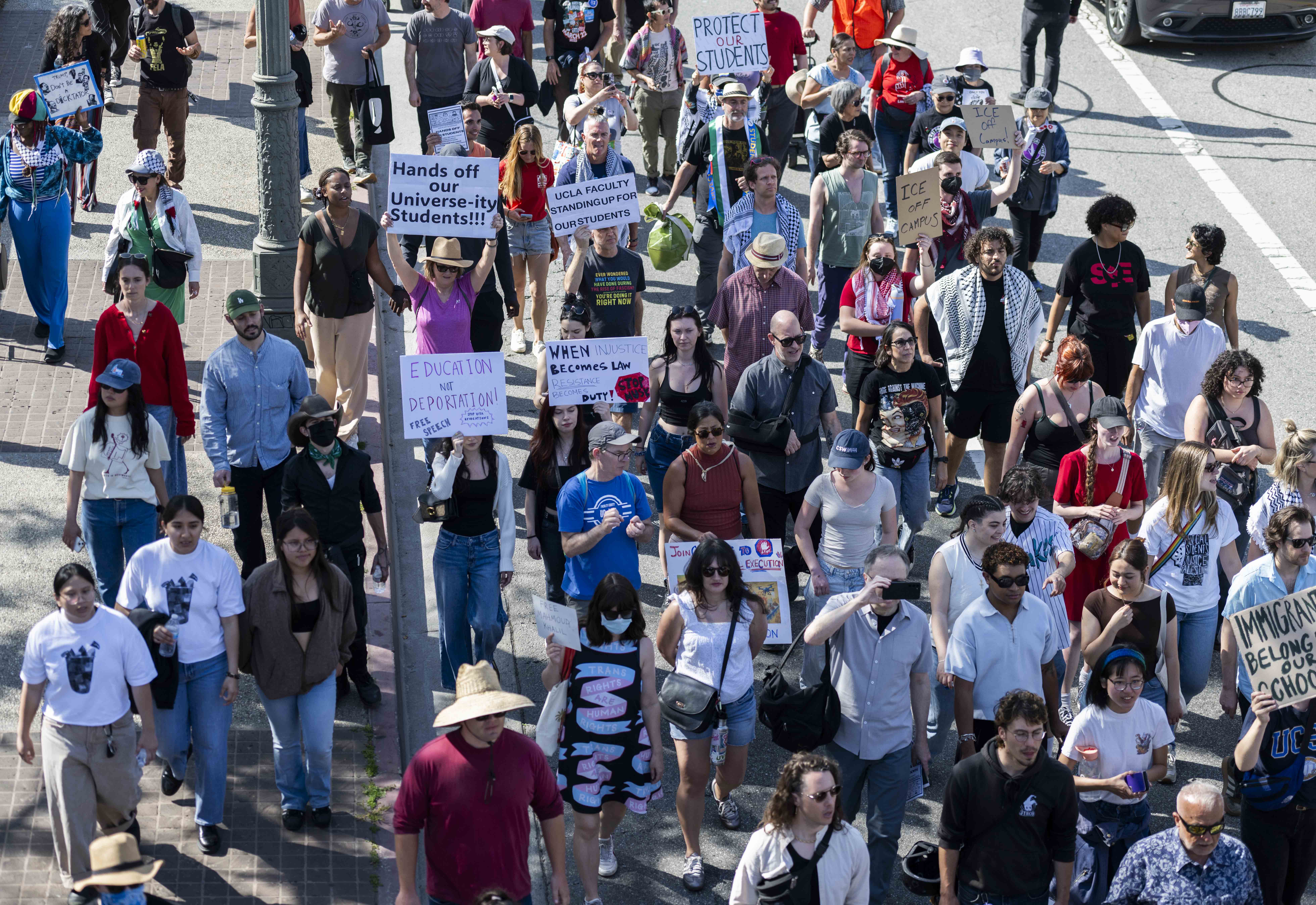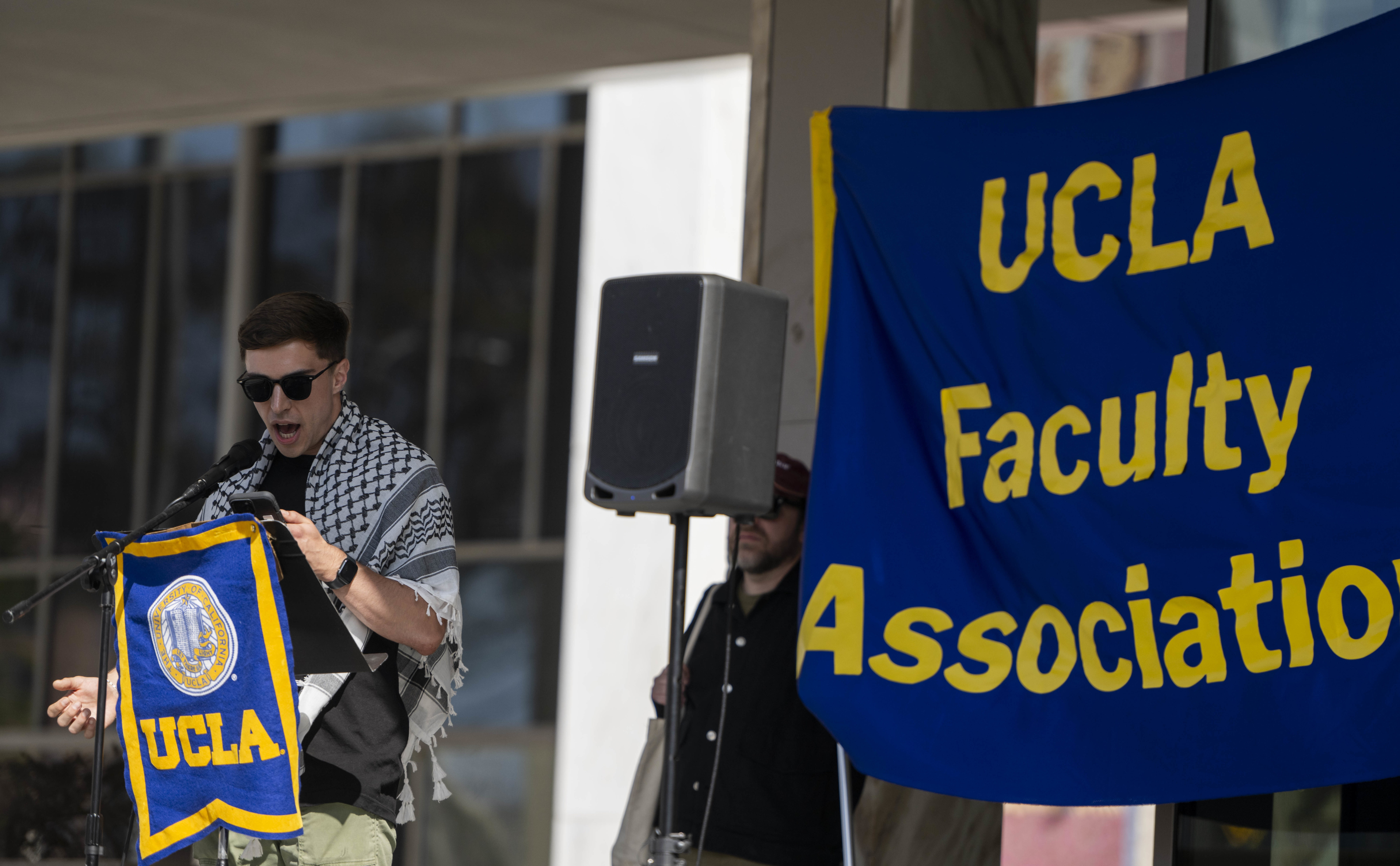UCLA Faculty Association protests recent student visa revocations in downtown LA
Protesters carry a UCLA Faculty Association banner and Palestinian flags down a street. The UCLA Faculty Association led a protest through downtown Los Angeles on Saturday afternoon. (Andrew Diaz/Daily Bruin)
By Gabrielle Gillette
April 13, 2025 11:12 p.m.
Around 150 people took to the streets of downtown Los Angeles on Saturday afternoon for UCLA Faculty Association’s protest against student visa revocations.
The protest, hosted alongside California Faculty Association and several other Southern California organizations, intended to rally against recent student visa revocations and deportations. The Trump administration has revoked the visas of at least 19 international students and alumni at UCLA, at least 50 students and alumni across the UC and nearly 1,000 students and recent alumni nationwide.
The deportations follow Trump’s January executive order, which threatened to revoke the visas of pro-Palestine protesters on university campuses. Minutes from a meeting between Undergraduate Students Associate Council officers and UCLA administrators found that students whose visas were revoked had previously been arrested for at least a misdemeanor.
The Daily Bruin was unable to confirm if the students were arrested in relation to pro-Palestine protests.
[Related: Students who had visas revoked were previously arrested, USAC meeting reveals]
Organizers gathered on the corner of Broadway Street and Temple Street, one block away from LA City Hall. The group started as around 15 people but grew in size as attendees from a nearby rally featuring Sen. Bernie Sanders and Rep. Alexandria Ocasio-Cortez joined after the event ended around 3 p.m.

As the street flooded with people exiting Sanders’ rally, they stopped to pick up a flyer or chant alongside organizers, increasing the crowd to around 150 people.
Michael Chwe, a UCLA Faculty Association executive board member, led the event’s programming. Chwe said he and other faculty have heard from students that they do not feel comfortable speaking out due to fear of retaliation.
He added that the UCLA Faculty Association wanted to let students know that faculty members support them.
“One of the most important things we’re trying to do here is let our students know that faculty care,” said Chwe, a professor of political science. “We have so many students telling us that they don’t feel comfortable speaking or even sending emails to their friends. … This is not the way to live.”
Speakers from UCLA, UC Irvine, California State University schools and other Southern California colleges condemned the Trump administration’s revocation of visas across the country.
Baba Akili, an instructor with the UCLA labor studies department and national field coordinator with Black Lives Matter Grassroots, said protesting is meant to disrupt, calling on attendees to tell their friends and neighbors that they were at the rally to ensure their message is heard.
“Other people who are sitting at home or on their way to the Dodgers game (are) going, ‘What’s going on over there?’” Akili said. “We cannot allow them to sit idly by and wonder what’s going on. They have got to be inconvenienced.”
After several speakers gave rallying calls punctuated by honking cars and cheers from people walking by, the crowd began marching down Temple Street to the 300 North Los Angeles Federal Building, which houses the Los Angeles Field Office for U.S. Immigration and Customs Enforcement.
Kaia Sargent and Robert Dellinger, two UCLA students, both said they expected a larger turnout to the protest, especially as it fell directly after Sanders’ rally.
“We were hoping that more people would filter from the crowd of 37,000 to this, so it’s a little sad to see,” said Sargent, a neuroscience graduate student. “There’s clearly a lot of energy, but I think maybe the fear tactics are working, or people didn’t know about this.”
Dellinger, an oceanic and atmospheric science postdoctoral student, said consistency is key with mobilization, and if people continue showing up, the movement will only grow.
Once the group arrived at the federal building, more speakers – including a representative from CSU Students for Quality Education and from Students for Justice in Palestine at UCLA – talked about their experiences with organizing and what they said was free speech suppression.

Zack Pine, a physics doctoral student at UCLA, shared an anonymous story about someone he knew who was worried about the state of their visa. The person now does not leave their house and checks their email constantly in anticipation of their visa revocation, he said.
“In light of all of this, it is my view that we can and should view both the ICE arrests and terminations of visas – politically motivated or otherwise – as being part of a broader plan by the Trump administration, whose immediate aspirations are to wage war with the working class,” Pine said.
Pine, one of the event’s organizers, said he does not often engage in public speaking. However, he heard about the event through the Democratic Socialists of America and wanted to help out, becoming more involved as time went on.
Chwe then read testimonies from some of his students who said they felt worried about expressing themselves publicly, adding that they feel an atmosphere of fear and uncertainty on campus.
Pine said in an interview that he was happy with the turnout, speakers and overall atmosphere. He added that he thinks there will be a gradual buildup of the movement.
Pine also said he anticipates seeing rallies get bigger as more people see their impact.
“I think what we’re seeing right now is this gradual buildup of this movement to counter the fascist influence that’s taking over in this country,” Pine said. “In the future, we’re going to see these actions – these rallies – get bigger and bigger as more folks see the impact, and I’m really excited to continue helping to make those things happen.”
